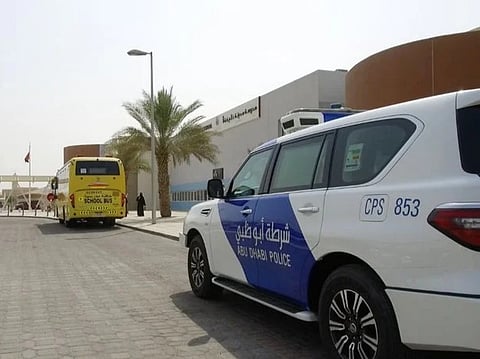Abu Dhabi Police address rumours about 'red pills' in schools
Authorities urge the public to always verify information through official channels

Abu Dhabi Police have dismissed as false the recurring social media rumours about the alleged presence and spread of so-called “red pills” in schools at the start of each academic year.

Brigadier Taher Gharib Al Dhaheri, Director of the Anti-Narcotics Directorate at Abu Dhabi Police, affirmed that these reports are entirely baseless. “At the beginning of every school year, social media becomes flooded with false claims alleging the spread of red pills in schools,” he said. “We assure parents and the public that there is no truth to these allegations—no such pills exist in our schools or universities.”
Al Dhaheri explained that the UAE’s global prominence naturally attracts attempts by detractors to spread misinformation. “Thanks to the wise leadership of our nation, the UAE has earned a strong and respected international standing,” he said. “It is therefore not surprising that malicious actors and online groups seek to spread falsehoods to undermine public confidence.”
He emphasized the importance of obtaining news and information from reliable, official sources, adding that Abu Dhabi Police maintain a relationship with the public built on transparency and trust. “We never conceal information from the community,” he said.
Al Dhaheri continued: “The UAE has achieved remarkable global success across all sectors, guided by the wisdom of our leadership. However, success attracts critics—those who cannot harm the UAE except through spreading lies and rumours. These individuals and organized electronic groups aim to create confusion and destabilize public opinion. We urge the community: do not believe these falsehoods. Always rely on official, trustworthy sources. The level of transparency between the security authorities and society is very high, and there is deep mutual trust between the Ministry of Interior, the police, and the public.”
Addressing the latest rumours about “red pills” in schools, Abu Dhabi Police clarified that certain individuals are photographing colorful, ordinary pills and spreading fabricated claims that they are being distributed among students. “We assure everyone that these are false and misleading claims—there are no such pills in our schools,” Al Dhaheri said. “We urge the public not to be misled by social media rumours and to always verify information through official channels. Our schools and universities are safe and completely free from such dangerous substances.”
Brigadier Al Dhaheri also called on society to treat recovering drug users with compassion and understanding. “We must not reject or stigmatize rehabilitated addicts,” he said. “On the contrary, we should embrace them with kindness and humanity to support their reintegration into society. We have observed that some recovering addicts relapse due to negative attitudes or rejection from those around them. Society must not treat them as outcasts, as such treatment hinders their recovery and often pushes them back toward addiction. The post-rehabilitation phase is, in fact, more critical than the treatment phase itself.”
Combating modern fraud schemes
The Abu Dhabi Police General Headquarters has launched the sixth edition of its awareness campaign, “Be Cautious,” this week as part of its ongoing efforts to enhance digital security and protect community members from modern fraud tactics. The campaign is being held in collaboration with the Ministry of Interior, other police commands, the Cyber Security Council, Abu Dhabi Media, First Abu Dhabi Bank, and Abu Dhabi Islamic Bank, and will run for three months.
Major General Mohammed Suhail Al Rashidi, Director of the Criminal Security Sector, affirmed that the campaign reflects Abu Dhabi Police’s continued commitment to raising public awareness about cybercrimes. He noted that it aligns with UAE Vision 2071 and Abu Dhabi Vision 2030, emphasizing the promotion of cybersecurity culture and public trust in reliable security-related media content.
He explained that the campaign features a series of educational events and awareness programs targeting all segments of society through social media platforms, media outlets, community councils, universities, and schools. Al Rashidi highlighted the importance of collaboration among stakeholders to ensure that awareness messages reach the widest possible audience.
The campaign also sheds light on emerging forms of cyber fraud, including fake links, deceptive calls, fraudulent prize messages, and scam shopping websites, urging the public to remain vigilant and to refrain from sharing personal or banking information with unverified entities.
Abu Dhabi Police message:
Every day, fraudsters devise new ways to deceive their victims. You might receive a phone call urging an urgent money transfer, a fake bank message containing a dangerous link, a fraudulent investment promising unreal profits, or an offer to buy fake gold or rent luxury chalets at extremely low prices—only to discover later that your money is gone.
All these scams share one goal: to steal your money.
Stay alert. Don’t fall into the trap. Be cautious.



